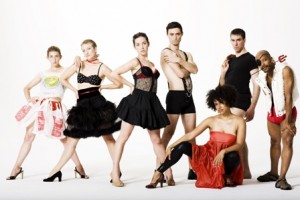JACOB’S PILLOW DANCE FESTIVAL
Jane Comfort and Company
June 29-July 3, 2011
Review by Anna Rogovoy
(BECKET, Mass., June 30, 2011) — “It’s always a surprise with Jane,” said Ella Baff, executive director of Jacob’s Pillow, as she welcomed audiences to Jane Comfort and Company’s performance in the Doris Duke Theatre on Thursday night. On the program were two works, Beauty and Underground River, and surprising they were — but maybe not in the way you would expect.
Beauty begins with a woman — Lisa Niedermeyer, a former company member returning as a guest in this engagement — getting ready to go out. With no apparent perception of the audience, she primps and preens in front of a mirrored vanity for most of the piece: putting on makeup, shaving her legs, wrestling herself into a pair of Spanx, etc. Her focus makes these routine and familiar tasks mesmerizing and a little frightening as we watch her transformation.
But the main event of the work is a beauty pageant: the “Barbie Beauty Contest.” Four dancers dressed in gaudy leotards pivot and pose robotically, only moving as much as Mattel’s plastic toy could have, as a voiceover dialogue between an emcee and each “Barbie” brings peals of laughter from the audience (“Do you have any causes that you champion?” “I do, actually. Swans.”). Comfort creates a series of vignettes such as this one, each different in specific content, all addressing the theme of society’s warped perception of feminine beauty. It’s a work of extremes — extreme appearances, extreme movement, and extreme discomfort as we observe how universally we are all implicated in the perpetuation of these unnatural ideals.
Men are implicated through Sean Donovan, the only male performer, who appears in a range of roles: as a runway coach, a video-blogger discussing “I.O.I.’s” (Indicators of Interest), a personal trainer, and a plastic surgeon who draws abstract circles and lines on the body of dancer Lucie Baker, presumably identifying “problem spots.”
Women are implicated when, even during a monologue about preferring tomboyish activities, Baker straps on high-heeled leather boots in which she and the other dancers perform an explicitly sexual music video-style number, suggesting that they have not yet found the courage to rebel that we — and Comfort — wish they could.
And we as spectators are implicated when, at the end of the piece, the house lights are illuminated and a select number of audience members are handed pencils and paper and asked to vote for the evening’s Barbie Beauty Queen. The results are tallied, a queen is chosen (Petra van Noort), and she stands stiff and alone as the “losers” strip off their makeup and change from their gaudy costumes into street clothes, gathering their things and walking offstage together. They are relaxed and as beautiful as we have seen them.
Underground River deals with darker stuff. Again, a voiceover dialogue informs us that there are characters here: Cara, a young girl, her parents, and a doctor. As the three adults coax Cara into squeezing their hands or signaling them with a blink, four women — Baker, van Noort, Leslie Cuyjet, and Elinor Harrison — perform fluid, sweeping movement phrases, sing, and manipulate puppets by Basil Twist.
In addition to how expertly she works in a multidisciplinary format, River is a testament to Comfort’s inventive use of text as a sound score. The performers almost never obliquely “perform” the words. Rather, they interpret the meaning and respond to the rhythms and melodies of the voices. As Cara is limited in her communication to the smallest gestures, the four dancers are restricted to abstraction. It’s moving in its simplicity and in the honesty and unafraid presences before us on the stage. Comfort’s choreographic voice is articulate, insightful, and strong, and her medium (the dancers, movements, sounds, and visual elements of her work) communicates a series of messages that beg and deserve to be heard.
Anna Rogovoy is The Rogovoy Report’s dance critic. She studies dance, literature and writing at Bennington College.

